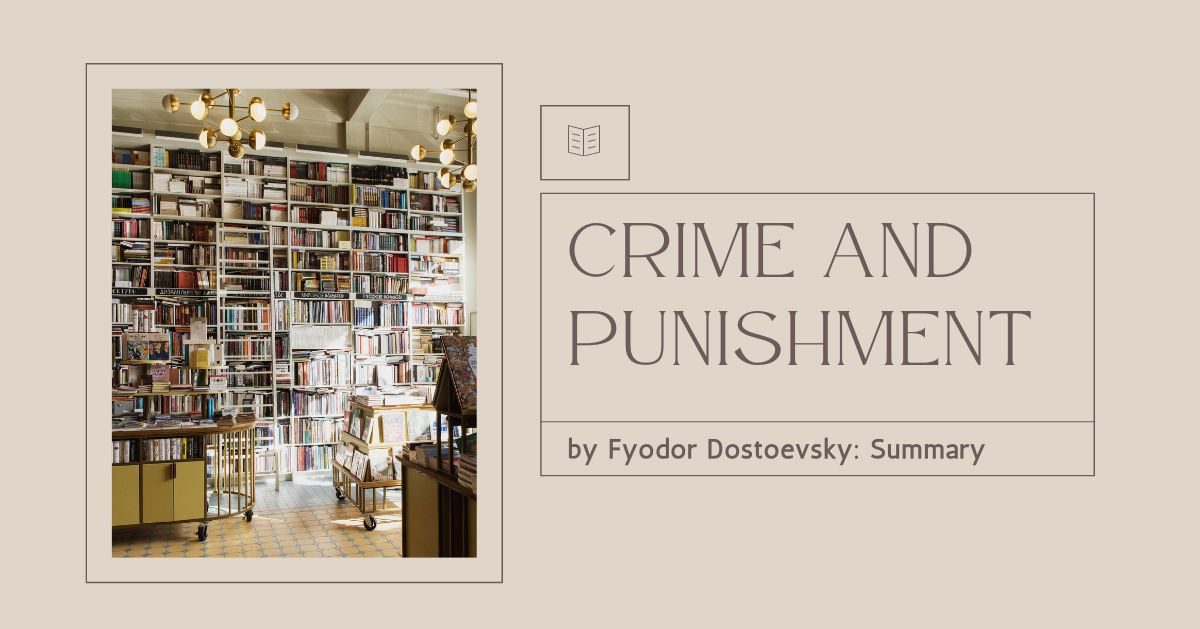Crime and Punishment by Fyodor Dostoevsky: Summary

“Crime and Punishment” stands as a literary creation by Fyodor Dostoevsky, initially published in 1866. The narrative unfolds within the backdrop of St. Petersburg, Russia, delving into the intricate explorations of the psychological and ethical dilemmas faced by its protagonist, Rodion Raskolnikov. This central figure grapples with the aftermath of committing a murder, and the narrative intricately unwraps the intricate web of his internal struggles.
Raskolnikov’s Hypothesis:
The story spins around Rodion Raskolnikov, a youthful and devastated ex-understudy. Raskolnikov has confidence in a hypothesis that specific phenomenal people, alluded to as “supermen,” reserve the privilege to violate cultural standards for a higher reason. He legitimizes that by killing the pawnbroker Alyona Ivanovna, he can take her cash and use it to help himself as well as other people, demonstrating his hypothesis.
The Homicide:
Driven by his hypothesis, Raskolnikov kills Alyona Ivanovna, yet additionally coincidentally kills her relative, Lizaveta. After the homicides, Raskolnikov faces extreme interior strife and responsibility. He endeavors to stay under control yet turns out to be progressively tortured by his activities.
Criminal investigator Examination:
The novel presents Porfiry Petrovich, a smart and instinctive police examiner who becomes dubious of Raskolnikov’s way of behaving. Porfiry draws in Raskolnikov in discussions, unpretentiously testing his mind and attempting to unwind reality behind the killings.
[You can Also Read: The Iliad by Homer: Summary]
Sonia’s Impact:
Sonia Marmeladov, a young lady constrained into prostitution to help her family, turns into a critical figure in Raskolnikov’s life. Raskolnikov is attracted to Sonia’s immovable confidence and sympathy notwithstanding her conditions. Sonia’s immaculateness and acknowledgment continuously lead Raskolnikov towards self-reflection and reclamation.
Mental Unrest:
Dostoevsky dives profound into Raskolnikov’s mind, depicting his internal conflict through his inside discourses. Raskolnikov’s brain swings among haughtiness and self-uncertainty, defenses and responsibility. His psychological state disintegrates as he fights his soul and appearances the outcomes of his activities.
Admission and Reclamation:
As the tension builds and his psychological state break down, Raskolnikov in the long run admits his violations to Sonia. This statement signifies a pivotal turning point within the narrative. Sonia, an image of sympathy and compassion, offers Raskolnikov the expectation of reclamation and the chance of reconstructing his broke moral compass.
Raskolnikov’s Separation:
Raskolnikov’s activities distance him from his loved ones. His sister, Dunya, and her life partner, Luzhin, battle with the result of his deeds. Luzhin’s calculated assumptions contribute to the intricate landscape of relationships in the story.
[You can Also Read: The Odyssey by Homer: Summary]
Moral and Philosophical Subjects:
“Crime and Punishment” dives into a horde of moral and philosophical topics. It takes a gander at the constraints of significant quality, the results of uncontrolled legitimization, and the power of human spirit. Dostoevsky additionally investigates neediness, class battle, and the human limit with respect to change and reclamation.
Raskolnikov’s Change:
Sonia’s impact and Raskolnikov’s progressive acknowledgment of his responsibility lead him on a way towards change. He comes to sort out the meaning of sympathy, affiliation, and human strength. The clever exhibits how veritable regret and acknowledgment of obligation can make ready for self-improvement.
The Peak and Goal:
As the story unfurls, Raskolnikov’s conflicts under the surface arrive at their pinnacle. The strain fills in as he grapples with the decision to concede his bad behaviors to the trained professionals. The novel finishes in a strong scene where Raskolnikov at last acquiescence to the police, recognizing his culpability and tolerating the discipline he accepts he merits.
[You can Also Read: The Divine Comedy by Dante Alighieri: Summary]
Conclusion:
“Fyodor Dostoevsky’s ‘Crime and Punishment’ emerges as a profound exploration of human psychology, moral values, and the repercussions of individual actions.” Through the outing of Rodion Raskolnikov, the original jumps into the profundities of culpability, recuperation, and the earth shattering power of genuine lament. With its rich person improvement and philosophical subjects, the original remaining parts an immortal work of art that keeps on enthralling perusers with its intricate depiction of the human condition.
